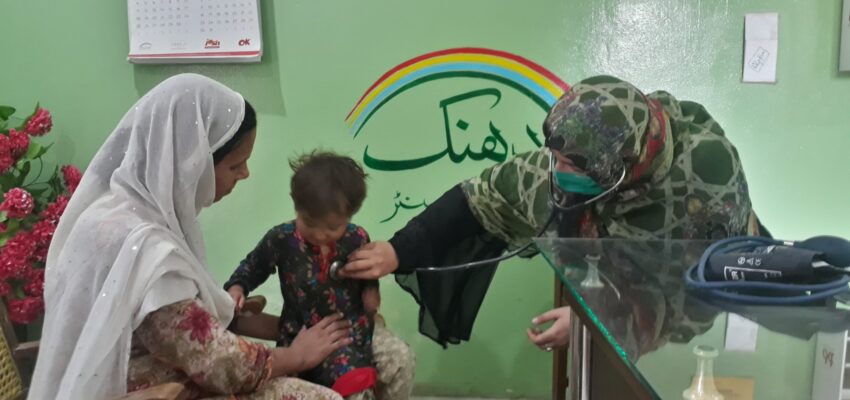Ruqia Younas, a Community Midwife in Pakistan

Above: Ruqia Younas treats a young patient in her Dhanak clinic in Bhattiwala, Pakistan.
Ruqia Younas earned her diploma in midwifery in 2011, excited to put her new skills to work and help the women and children of her village in Punjab Province, central Pakistan. But Ruqia didn’t have the resources to open her own clinic, and struggled to find her niche. She provided only home deliveries but no maternal and child health care or family planning. It was not easy.
In 2014, Ruqia heard about Dhanak Health Care Centers, a new clinic network launched by DKT Pakistan to address a lack of maternal health and family planning that kept Pakistan’s modern contraceptive prevalence rate (26%) the second lowest in South Asia, after Afghanistan.
Ruqia was accepted by the network, and Dhanak (which means “rainbow” in Urdu) provided her with the training, infrastructure, products and supervision necessary to open her own clinic in the village of Bhattiwala. Since then, Ruqia has been providing maternal and child health care, selling a range of contraceptive products and administering injectables and intrauterine devices (IUDs). She also provides post-abortion care services and helps women manage their miscarriages.
Her monthly client flow has increased from around 20 in 2014 to 50 in 2020. The IUD is the most popular contraceptive; she inserts 3-5 per month. People like IUDs because they can remove them when they want, and the new versions are smaller and have fewer side effects.
Ruqia is proud of her work. She says that the best thing is that it gives her the opportunity to bring new babies into the world and provide family planning to the poor of her community.
People are starting to appreciate family planning, she says, including men. “Family planning awareness in my village has gotten better in the six years since my Dhanak clinic opened and the concept of family planning has become more widely accepted. Unintended pregnancy is not really a problem anymore.”
“Dhanak brought big changes to my life. As I have acquired more experience, people trust me more and my relationships with them have improved. The word about me goes out, with clients talking to other people. People now ask about me, even from distant places.”
Ruqia has observed women in her community having fewer children than before. This follows the national trend in which the fertility rate for women 15-49 has dropped from 4.9 children per woman in 1990 to 3.6 in 2017.
Ruqia herself is part of that trend. Because she and her husband have two children and do not want any more, she uses a DKT Heer IUD to manage her fertility.
“I just didn’t want any more than two,” she says. “I wanted to focus on the ones I had so they could grow up well.”




